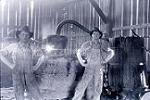Bourbon Resolution
Moderator: Squire
Re: Bourbon Resolution
The copies I have all say 1963.
Mike Veach
"Our people live almost exclusively on whiskey" - E H Taylor, Jr. 25 April 1873
"Our people live almost exclusively on whiskey" - E H Taylor, Jr. 25 April 1873
-

bourbonv - Registered User
- Posts: 4086
- Joined: Thu Oct 14, 2004 7:17 pm
- Location: Louisville, Ky.
Re: Bourbon Resolution
Okay Mike,
(and for y'all who're reading this and can't see how DaVeach & myself are grinning while we talk about these things like this in person, these kinds of conversations are not adversarial and usually occur whilst we're sharing each others' finest whiskeys)
Mike, I've seen you pin the difference between a spring bottling and a fall bottling of the same product; are you trying to say you were unable to tell the difference between pre-prohibition refugee Tennessee-style whiskey made in Kentucky and current Diageo whiskey made at the distillery Schenley built in 1959? I ain't buyin' it. By the way, would the Stitzel version have been the same as the Jack Daniel's made in Alabama? I doubt that, too.

I do, however, feel that another contributing factor may have been that, in the days when most of what we call "brown spirits" today (bourbon, rye, scotch, rum) was consumed unaged, the term "Old" was often applied to aged product. It's still that way in non-English cultures: añejo tequila or rum means "old" (not just aged, but also age-ed) tequila or rum; VSOP or XO brandy, in which the "O" is for old and which indicates the temporal distance from "new make".
(and for y'all who're reading this and can't see how DaVeach & myself are grinning while we talk about these things like this in person, these kinds of conversations are not adversarial and usually occur whilst we're sharing each others' finest whiskeys)
I'm not sure how that plays with the scientific process... just what is it about having seen the Cascade studies that would bring you to that conclusion? Have you seen similar studies made of other Tennessee distilleries? Which ones? Not to mention that you yourself have pointed out that the so-called Lincoln County process was neither limited to, nor particularly representative of, distillers located in Tennessee. In fact, according to President Taft's findings, that was the predominant method of making whiskey in the United States up through the early 1900s, at least among those distillers that had been targeted by the straight whiskey trust.I have seen studies of how Tennessee whisky was made at Cascade, and I don't think it was radically different from the other Tennessee whiskeys made prior to prohibition.
So if Cascade was going to all that trouble to prevent off-flavors (which may have included a strong maple flavor), could that not have been an attempt at improvement over "normal" methods (which perhaps did introduce a maple flavor)? Certainly the fact that one distillery made such an effort does nothing to sustain a belief that the effort was universal.I don't think there was more maple flavor, at least not from the leeching vats, because the one thing they were sure to do was to make sure it was all char and no "raw" wood that could have bacteria and other things growing on it.
Okay, and I have tasted Old Crow Bourbon Whiskey made during prohibition in Montreal Canada. What do either of those facts have to do with what Jack Daniel's tastes/tasted like? Other than that neither tasted like J.D. any more than they tasted like their respective U.S. whiskeys bearing those brand names.Now I have tasted Cascade made before prohibition. It was made in Louisville at the Stitzel Distillery, but it was made using the Lincoln County Process and I have seen Sanborn Insurance Maps showing the charcoal vats at the Stitzel Distillery in 1912. There was not a great difference in flavors of what is made today, other than the usual difference that I attribute to lower distillation and barrel proofs.
Mike, I've seen you pin the difference between a spring bottling and a fall bottling of the same product; are you trying to say you were unable to tell the difference between pre-prohibition refugee Tennessee-style whiskey made in Kentucky and current Diageo whiskey made at the distillery Schenley built in 1959? I ain't buyin' it. By the way, would the Stitzel version have been the same as the Jack Daniel's made in Alabama? I doubt that, too.
I completely agree with what you're saying here, Mike, although now that I'm not very far from being able to add "Great" to that term, I'm afraid I'd just as soon overlook that "Old" part.There has always been a bit of Nostalgia associated with the sale of whiskey... The word "Old" in the brand name not only indicates age, but once again evokes a since of nostalgia... My favorite is "Old Grand Dad" - who does not get a little nostalgic when they think of their Grand Dad?
I do, however, feel that another contributing factor may have been that, in the days when most of what we call "brown spirits" today (bourbon, rye, scotch, rum) was consumed unaged, the term "Old" was often applied to aged product. It's still that way in non-English cultures: añejo tequila or rum means "old" (not just aged, but also age-ed) tequila or rum; VSOP or XO brandy, in which the "O" is for old and which indicates the temporal distance from "new make".
Well, all I can "say" about that is that, while that may be true of the ads, these are pre-Pro Jack Daniel labels. Other than the "Uncle Jack" one, they might be pre-Motlow. Except as part of an address, where do you see "Tennessee" being touted?You had better go back and look at some 19th century advertisements for Tennessee Whiskeys. Maybe take Gary with you. Old No. 7, Cascade and Greenbrier all used the term "Tennessee Whisk(e)y" (Cascade did not use the "e").
- Attachments
-
- JackDaniel_antique.jpg (89.6 KiB) Viewed 6012 times
-
- JackDaniel_PrePro-back.jpg (146.11 KiB) Viewed 6010 times
Last edited by EllenJ on Sun Aug 23, 2009 7:20 pm, edited 1 time in total.
-

EllenJ - Registered User
- Posts: 866
- Joined: Sun Feb 26, 2006 11:00 pm
- Location: Ohio-occupied Northern Kentucky (Cincinnati)
Re: Bourbon Resolution
Mike,
You had mentioned that you thought the leeching vats not to be the source of any maple flavor in the whiskey, but in an earlier post I'd brought up another idea. I forgot to mention it to you last night, but it might be worth considering.
Some time ago you and Chris Morris did a (somewhat exciting, you pyromaniac you) experiment using straw to char a new oak whiskey barrel, much as early farmer/distillers are rumored to have.
But suppose straw wasn't the common charring flammable? What if, for example, sorghum (commonly found in southern Kentucky and Tennessee) was the "enflamant du jour" amongst the barrel-charring set?
Gary has brought up the use of molasses as a barrel-sealant. What about maple syrup? Would painting the inside of a new oak barrel with sorghum molasse, or better yet maple syrup, prior to charring it affect the sugars that the whiskey would draw out of that barrel? You bet it would. Would whiskey shipped in such a barrel fetch a better price than whiskey shipped in a straw-fired barrel? I'd bet it would; especially among the sort of customers who enjoy Southern Comfort or Rock 'n' Rye.
You had mentioned that you thought the leeching vats not to be the source of any maple flavor in the whiskey, but in an earlier post I'd brought up another idea. I forgot to mention it to you last night, but it might be worth considering.
Some time ago you and Chris Morris did a (somewhat exciting, you pyromaniac you) experiment using straw to char a new oak whiskey barrel, much as early farmer/distillers are rumored to have.
But suppose straw wasn't the common charring flammable? What if, for example, sorghum (commonly found in southern Kentucky and Tennessee) was the "enflamant du jour" amongst the barrel-charring set?
Gary has brought up the use of molasses as a barrel-sealant. What about maple syrup? Would painting the inside of a new oak barrel with sorghum molasse, or better yet maple syrup, prior to charring it affect the sugars that the whiskey would draw out of that barrel? You bet it would. Would whiskey shipped in such a barrel fetch a better price than whiskey shipped in a straw-fired barrel? I'd bet it would; especially among the sort of customers who enjoy Southern Comfort or Rock 'n' Rye.
-

EllenJ - Registered User
- Posts: 866
- Joined: Sun Feb 26, 2006 11:00 pm
- Location: Ohio-occupied Northern Kentucky (Cincinnati)
Re: Bourbon Resolution
John, I wish I could find again that reference to molasses barrels. To the best of my recollection, the whiskey sold was new Mon white whiskey, from rye, and it was retailed from a barrel that had held molasses, clearly to soften and lend a certain je ne sais quoi. Absolutely ex-maple syrup or sorghum barrels would have been used too.
Really this is a kind of rectification.
As for maple flavour from the stacks of maple charcoal for Tennessee whiskey and indeed any whiskey so treated, since as you say the technique was widespread at one time, I believe a maple note must have been conveyed to the whiskey. And this connects then to this other tradition of selling white whiskey from a barrel that used to hold molasses or maple sugar.
Gary
Really this is a kind of rectification.
As for maple flavour from the stacks of maple charcoal for Tennessee whiskey and indeed any whiskey so treated, since as you say the technique was widespread at one time, I believe a maple note must have been conveyed to the whiskey. And this connects then to this other tradition of selling white whiskey from a barrel that used to hold molasses or maple sugar.
Gary
-

gillmang - Vatman
- Posts: 2173
- Joined: Mon Jan 24, 2005 4:44 pm
Re: Bourbon Resolution
cowdery wrote:Mike,
I was just looking back at the beginning of the thread. Did the document you saw really say 1963? If so, did you happen to record its complete provenance? The resolution passed on that date in 1964.
Chuck,
Where does the 1964 date come from. I too have always heard 1964, but these documents are clearly 1963 and while reading Carson's "Social History" I was struck by this quote:
" Beady old bourbon, which takes age so gracefully, has recently been accorded recognition as one of the world's small number of authentic spirits, unique to the United States."
Surley he is talking about the resolution from Congress here. Carson was published in 1963 and written early enough that he still refers to Kennedy as President.
Mike Veach
"Our people live almost exclusively on whiskey" - E H Taylor, Jr. 25 April 1873
"Our people live almost exclusively on whiskey" - E H Taylor, Jr. 25 April 1873
-

bourbonv - Registered User
- Posts: 4086
- Joined: Thu Oct 14, 2004 7:17 pm
- Location: Louisville, Ky.
Re: Bourbon Resolution
Of course, these resolutions take a long time to get to this stage; the result may have been commonly accepted for several months before actually being committed to a resolution. And it probably took a few more months before this was actually signed into law. But it seems that would certainly support Chuck's position on 1964 as the year.
- Attachments
-
 Senate Resolution 9 May 4 1964 .pdf
Senate Resolution 9 May 4 1964 .pdf- This is a PDF; you might need to download Adobe Acrobat Reader to access it.
- (25.57 KiB) Downloaded 454 times
-

EllenJ - Registered User
- Posts: 866
- Joined: Sun Feb 26, 2006 11:00 pm
- Location: Ohio-occupied Northern Kentucky (Cincinnati)
Re: Bourbon Resolution
Yeah, like John said. Also Beam, although they quote it erroneously, always cites 1964 as the year the resoluton was passed.
I don't see early distillers coating the inside of barrels with some kind of syrup to improve the flavor, but I can see them doing it in the belief that it would prevent leaks, which was a much greater concern.
I don't see early distillers coating the inside of barrels with some kind of syrup to improve the flavor, but I can see them doing it in the belief that it would prevent leaks, which was a much greater concern.
-

cowdery - Registered User
- Posts: 1586
- Joined: Tue Oct 19, 2004 1:07 pm
- Location: Chicago
22 posts
• Page 2 of 2 • 1, 2
Who is online
Users browsing this forum: No registered users and 236 guests
